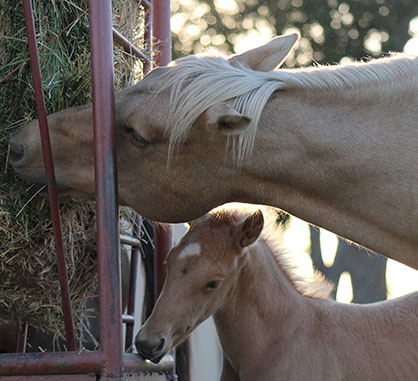Smart Tips for Seasonal Changes
SmartPak has the information you need to help your horse prepare for fall
PLYMOUTH, MA – October 16, 2017 – Fall brings great riding weather to many areas of the country, but it also brings unique challenges to horse owners as they prepare for the cooler season ahead. You’re not alone this season though, because SmartPak is here with expert tips on how to help your horse cope with weather changes.
As temperatures drop, horse owners should start evaluating their horse’s diet and management routine and make any adjustments needed. When preparing your horse for winter weather, there are several key areas that should be considered including hydration, diet, body condition, and supplements.
“As the seasons change, our riding and horse care routines change, too,” said Sarah Mann, Vice President of Brand and Customer Experience at SmartPak. “While we know different regions and different barns will have their own unique challenges, there are three major areas that we think are important to be mindful of as we head into fall – hydration, weight, and diet.”
Healthy hydration is important all year round, but changing temperatures in the fall can prove problematic. A research study at the School of Veterinary Medicine at the University of Pennsylvania showed that while horses seem to prefer very cold water, they don’t drink as much total water as they do when the water is warmer. And if your horse is drinking less, he may be at risk for dehydration. Even worse, if buckets or troughs freeze solid, your horse can’t get any water at all! To help keep water free from ice and on the warmer side, you can use insulated bucket covers or heated water buckets in the barn, and de-icers out in your water troughs. Adding a daily serving of salt or electrolytes to your horse’s diet is also a smart way to encourage him or her to drink up, all winter long. SmartSalt Pellets and Leg Up Electrolyte are two tasty pelleted products that support healthy hydration.
Another way to help set your horse up for success with seasonal changes is to make sure he’s at a healthy weight. Many horses gain weight as you’re riding and exercising them less during the winter months, while many others end up losing weight as their bodies burn extra calories just staying warm. That’s why it’s a smart idea to evaluate your horse’s body condition now, and then monitor it throughout the season and into the winter months for any changes. A great way to measure your horse’s body condition is by using the Henneke Horse Body Conditioning Scoring System. You can learn more about how to do this at SmartPak.com/BodyConditionQuiz
With water and weight checked off your list, it’s time to evaluate your horse’s diet. All year round, your horse should be receiving 1-2% of his or her body weight in forage (hay or pasture) every day – for a 1,000 lbs horse, that’s 10-20 lbs/day. However, come winter, your horse is likely to be burning more of that forage as calories used to stay warm, so he or she may benefit from some extra hay. If forage alone isn’t enough for your horse to maintain a healthy weight, you could add or increase grain, however that comes with extra sugar, which isn’t the best choice for your horse’s overall health. Instead, you can add a fat supplement like 99% Fat by SmartPak to provide a “cool” source of calories, without any added sugar.
Speaking of supplements, many horse owners decide to change up their horse’s supplement plans during the winter months, particularly if their horse has the winter “off.” While it’s absolutely appropriate to adjust your horse’s supplements in accordance with his or her workload, it’s not recommended to pull your horse off supplements altogether, as many areas of the body are under stress even if your horse isn’t in heavy work. For example, extra time spent in a stall, which is very common in the winter, can increase your horse’s risk of gastric ulcers and colic. That’s why SmartPak recommends continuing to support your horse’s health all year round. If you’d like help adjusting your horse’s supplement program based on changes in your seasonal routine, SmartPak’s Supplement Experts are just a call, email, chat, or text away!
If you’d like to learn more about building a better diet for your horse, you won’t want to miss SmartPak’s Ultimate Horse Nutrition Guide. This helpful guide will walk you through what factors you need to consider when building your horse’s diet, including forage, concentrates, and supplements. Read all of the tips at SmartPak.com/Nutrition.











